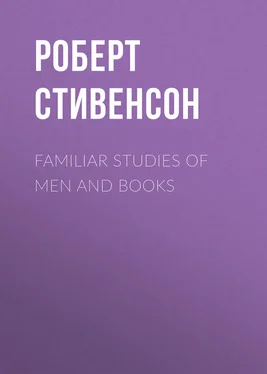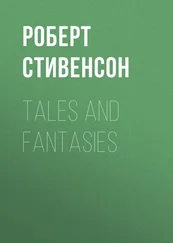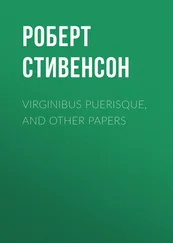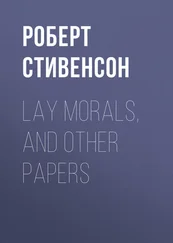Роберт Стивенсон - Familiar Studies of Men and Books
Здесь есть возможность читать онлайн «Роберт Стивенсон - Familiar Studies of Men and Books» — ознакомительный отрывок электронной книги совершенно бесплатно, а после прочтения отрывка купить полную версию. В некоторых случаях можно слушать аудио, скачать через торрент в формате fb2 и присутствует краткое содержание. Жанр: foreign_home, literature_19, на английском языке. Описание произведения, (предисловие) а так же отзывы посетителей доступны на портале библиотеки ЛибКат.
- Название:Familiar Studies of Men and Books
- Автор:
- Жанр:
- Год:неизвестен
- ISBN:нет данных
- Рейтинг книги:3 / 5. Голосов: 1
-
Избранное:Добавить в избранное
- Отзывы:
-
Ваша оценка:
- 60
- 1
- 2
- 3
- 4
- 5
Familiar Studies of Men and Books: краткое содержание, описание и аннотация
Предлагаем к чтению аннотацию, описание, краткое содержание или предисловие (зависит от того, что написал сам автор книги «Familiar Studies of Men and Books»). Если вы не нашли необходимую информацию о книге — напишите в комментариях, мы постараемся отыскать её.
Familiar Studies of Men and Books — читать онлайн ознакомительный отрывок
Ниже представлен текст книги, разбитый по страницам. Система сохранения места последней прочитанной страницы, позволяет с удобством читать онлайн бесплатно книгу «Familiar Studies of Men and Books», без необходимости каждый раз заново искать на чём Вы остановились. Поставьте закладку, и сможете в любой момент перейти на страницу, на которой закончили чтение.
Интервал:
Закладка:
This half apology apart, nothing more falls to be said except upon a remark called forth by my study in the columns of a literary Review. The exact terms in which that sheet disposed of Burns I cannot now recall; but they were to this effect – that Burns was a bad man, the impure vehicle of fine verses; and that this was the view to which all criticism tended. Now I knew, for my own part, that it was with the profoundest pity, but with a growing esteem, that I studied the man’s desperate efforts to do right; and the more I reflected, the stranger it appeared to me that any thinking being should feel otherwise. The complete letters shed, indeed, a light on the depths to which Burns had sunk in his character of Don Juan, but they enhance in the same proportion the hopeless nobility of his marrying Jean. That I ought to have stated this more noisily I now see; but that any one should fail to see it for himself, is to me a thing both incomprehensible and worthy of open scorn. If Burns, on the facts dealt with in this study, is to be called a bad man, I question very much whether either I or the writer in the Review have ever encountered what it would be fair to call a good one. All have some fault. The fault of each grinds down the hearts of those about him, and – let us not blink the truth – hurries both him and them into the grave. And when we find a man persevering indeed, in his fault, as all of us do, and openly overtaken, as not all of us are, by its consequences, to gloss the matter over, with too polite biographers, is to do the work of the wrecker disfiguring beacons on a perilous seaboard; but to call him bad, with a self-righteous chuckle, is to be talking in one’s sleep with Heedless and Too-bold in the arbour.
Yet it is undeniable that much anger and distress is raised in many quarters by the least attempt to state plainly, what every one well knows, of Burns’s profligacy, and of the fatal consequences of his marriage. And for this there are perhaps two subsidiary reasons. For, first, there is, in our drunken land, a certain privilege extended to drunkenness. In Scotland, in particular, it is almost respectable, above all when compared with any “irregularity between the sexes.” The selfishness of the one, so much more gross in essence, is so much less immediately conspicuous in its results that our demiurgeous Mrs. Grundy smiles apologetically on its victims. It is often said – I have heard it with these ears – that drunkenness “may lead to vice.” Now I did not think it at all proved that Burns was what is called a drunkard; and I was obliged to dwell very plainly on the irregularity and the too frequent vanity and meanness of his relations to women. Hence, in the eyes of many, my study was a step towards the demonstration of Burns’s radical badness.
But second, there is a certain class, professors of that low morality so greatly more distressing than the better sort of vice, to whom you must never represent an act that was virtuous in itself, as attended by any other consequences than a large family and fortune. To hint that Burns’s marriage had an evil influence is, with this class, to deny the moral law. Yet such is the fact. It was bravely done; but he had presumed too far on his strength. One after another the lights of his life went out, and he fell from circle to circle to the dishonoured sickbed of the end. And surely for any one that has a thing to call a soul he shines out tenfold more nobly in the failure of that frantic effort to do right, than if he had turned on his heel with Worldly Wiseman, married a congenial spouse, and lived orderly and died reputably an old man. It is his chief title that he refrained from “the wrong that amendeth wrong.” But the common, trashy mind of our generation is still aghast, like the Jews of old, at any word of an unsuccessful virtue. Job has been written and read; the tower of Siloam fell nineteen hundred years ago; yet we have still to desire a little Christianity, or, failing that, a little even of that rude, old, Norse nobility of soul, which saw virtue and vice alike go unrewarded, and was yet not shaken in its faith.
Walt Whitman . – This is a case of a second difficulty which lies continually before the writer of critical studies: that he has to mediate between the author whom he loves and the public who are certainly indifferent and frequently averse. Many articles had been written on this notable man. One after another had leaned, in my eyes, either to praise or blame unduly. In the last case, they helped to blindfold our fastidious public to an inspiring writer; in the other, by an excess of unadulterated praise, they moved the more candid to revolt. I was here on the horns of a dilemma; and between these horns I squeezed myself with perhaps some loss to the substance of the paper. Seeing so much in Whitman that was merely ridiculous, as well as so much more that was unsurpassed in force and fitness, – seeing the true prophet doubled, as I thought, in places with the Bull in a China Shop, – it appeared best to steer a middle course, and to laugh with the scorners when I thought they had any excuse, while I made haste to rejoice with the rejoicers over what is imperishably good, lovely, human, or divine, in his extraordinary poems. That was perhaps the right road; yet I cannot help feeling that in this attempt to trim my sails between an author whom I love and honour and a public too averse to recognise his merit, I have been led into a tone unbecoming from one of my stature to one of Whitman’s. But the good and the great man will go on his way not vexed with my little shafts of merriment. He, first of any one, will understand how, in the attempt to explain him credibly to Mrs. Grundy, I have been led into certain airs of the man of the world, which are merely ridiculous in me, and were not intentionally discourteous to himself. But there is a worse side to the question; for in my eagerness to be all things to all men, I am afraid I may have sinned against proportion. It will be enough to say here that Whitman’s faults are few and unimportant when they are set beside his surprising merits. I had written another paper full of gratitude for the help that had been given me in my life, full of enthusiasm for the intrinsic merit of the poems, and conceived in the noisiest extreme of youthful eloquence. The present study was a rifacimento. From it, with the design already mentioned, and in a fit of horror at my old excess, the big words and emphatic passages were ruthlessly excised. But this sort of prudence is frequently its own punishment; along with the exaggeration, some of the truth is sacrificed; and the result is cold, constrained, and grudging. In short, I might almost everywhere have spoken more strongly than I did.
Thoreau . – Here is an admirable instance of the “point of view” forced throughout, and of too earnest reflection on imperfect facts. Upon me this pure, narrow, sunnily-ascetic Thoreau had exercised a great charm. I have scarce written ten sentences since I was introduced to him, but his influence might be somewhere detected by a close observer. Still it was as a writer that I had made his acquaintance; I took him on his own explicit terms; and when I learned details of his life, they were, by the nature of the case and my own parti-pris , read even with a certain violence in terms of his writings. There could scarce be a perversion more justifiable than that; yet it was still a perversion. The study indeed, raised so much ire in the breast of Dr. Japp (H. A. Page), Thoreau’s sincere and learned disciple, that had either of us been men, I please myself with thinking, of less temper and justice, the difference might have made us enemies instead of making us friends. To him who knew the man from the inside, many of my statements sounded like inversions made on purpose; and yet when we came to talk of them together, and he had understood how I was looking at the man through the books, while he had long since learned to read the books through the man, I believe he understood the spirit in which I had been led astray.
Читать дальшеИнтервал:
Закладка:
Похожие книги на «Familiar Studies of Men and Books»
Представляем Вашему вниманию похожие книги на «Familiar Studies of Men and Books» списком для выбора. Мы отобрали схожую по названию и смыслу литературу в надежде предоставить читателям больше вариантов отыскать новые, интересные, ещё непрочитанные произведения.
Обсуждение, отзывы о книге «Familiar Studies of Men and Books» и просто собственные мнения читателей. Оставьте ваши комментарии, напишите, что Вы думаете о произведении, его смысле или главных героях. Укажите что конкретно понравилось, а что нет, и почему Вы так считаете.












